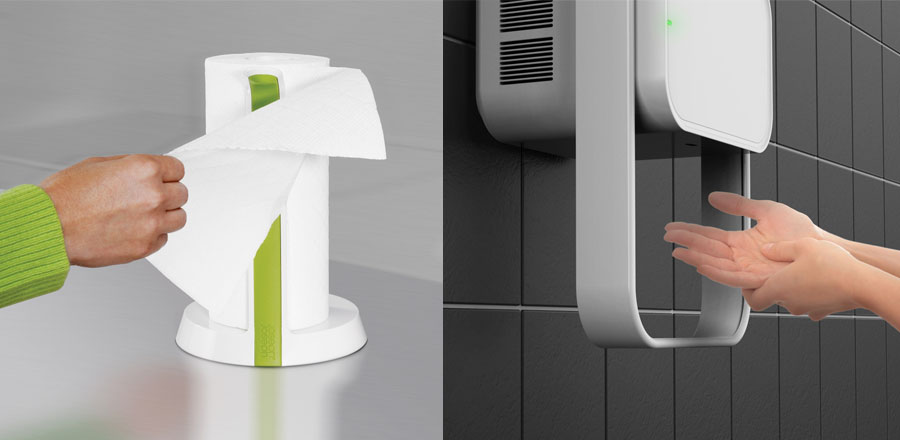
Paper Towels Versus Hand Dryers, An On-Going Debate

Study Shows Clear Preference for Towels
As evidence of this mindset, in a survey conducted this past summer by Cintas Corporation, nearly seven in 10 U.S. adults prefer paper towels over air dryers in public restrooms. Of those that chose paper towels as their preferred method to dry their hands in a public restroom, a whopping 52% said that paper towels provide something to open the restroom door with. Other reasons cited for the preference of paper towels pointed toward the speed and efficiency that they bring to the hand drying experience.
“What this data tells us is that the majority of Americans want a quick, thorough and hygienic public restroom experience,” said John Engel, Director of Marketing for Cintas. He also added that “Studies show that germs can be more easily transferred to and from wet hands, which is why drying hands after washing them is essential to staving off bacteria and limiting the spread of infection.”
Does Preference Support Hygiene
According to the Microbiology Society, jet air dryers (which use a thin layer of air traveling at high speed to remove water) are incredibly efficient at dispersing micro-organisms into the environment. Researchers studied this phenomenon by placing an array of petri dishes that replicated the height and size of average men, women and children near hand dryers in a simulated public lavatory. Researchers next washed their hands in a harmless microbial solution that would interact with the petri dishes when they dried their hands. What they found was that air dryers and jet air dryers, in particular, could potentially spread disease as much as 1,300 times more than paper towels. Maximum exposure was found to be between 0.75 and 1.25 meters from the source (the air dryers). While the study used relatively high concentrations of bacteriophage virus so that they could be easily detected, researchers insist that concentrations weren’t outside the realms of possibility for what someone could have on their hands when using these devices.
Dyson, the manufacturer of the high-tech hand dryer, Airblade says that studies like the one above are “misleading” scaremongering tactics by tissue and paper towel manufacturers. The company further asserts that the study is dubious because of the high concentration of contaminants and the lack of a realistic environment. In a 2014 video, Dyson refutes the charges asserted against its product and produces evidence that the Airblade reduces the transference of germs by up to 40 percent.
Cost of Operation: Towels Versus Dryers
Hygiene is not the only deciding factor in the decade’s long debate between paper towels and air dryers. Cost of operation is another clear differentiator. Industry experts seem to agree that hand dryers are much less expensive to operate than paper towels. At an average cost of less than a penny in electricity per dry vs a paper towel that typically costs about 1 cent per sheet (and most people use on average 2.5 sheets), it’s clear how quickly the cost of paper towels can add up. The interesting thing about paper towels is the accompanying ancillary costs associated with their use. For instance, paper towels usually require regular cleanups by restroom attendants to prevent messes throughout the area. Additional problems and costs can result from people flushing the towels down toilets, causing them to be clogged. For this reason, the cost and the hygiene problems of using paper towels can become significant.
As an additional consideration point, according to the treehugger.com, air dryers are significantly more green-minded than paper towels. The site’s writers contend that based on an independent study conducted by Environmental Resource Management, the manufacture, supply and energy consumption of air dryers is far less ecologically impacting than the manufacture, supply and disposal of paper towels. While costs such as these don’t necessarily go to the building manager’s bottom line, they may play to their green-mindedness.
Deciding between Towels and Dryers
There’s no clear right answer here. More than likely, the decision is going to be based on the dynamics of a particular building. High traffic buildings may demand the convenience and expediency of paper towels. While that decision also requires that bins need to be emptied and kept clean, it may be worth it and within the building’s maintenance and operation budgets. Noise levels, LEED certification, the presence of restroom attendants are all additional factors for consideration as well as the composition and preference of the building’s tenants. In the Cintas survey, it was found that seventy-six percent of Americans aged 35-44 prefer paper towels compared to only 60 percent of those aged 18-34.
